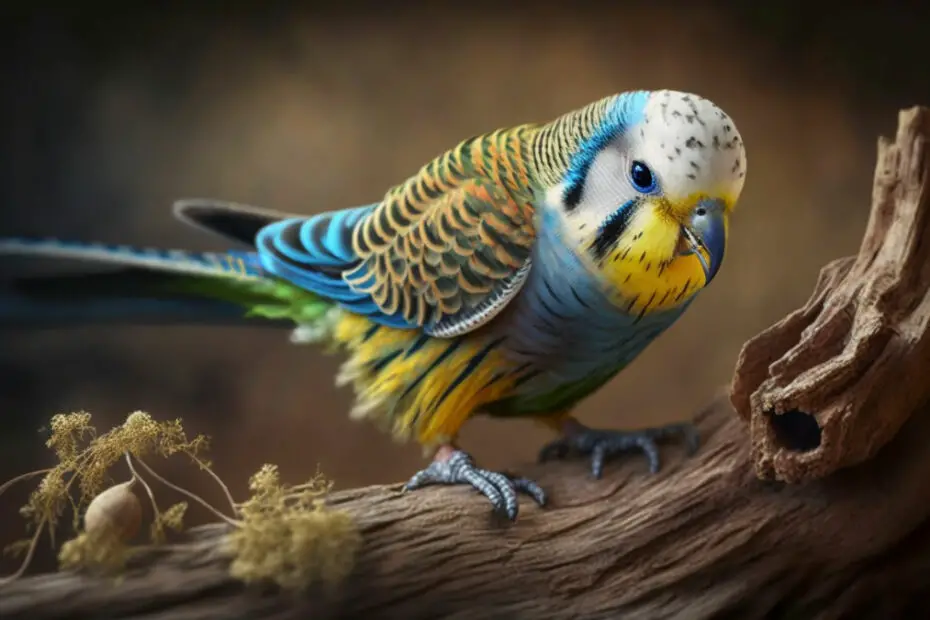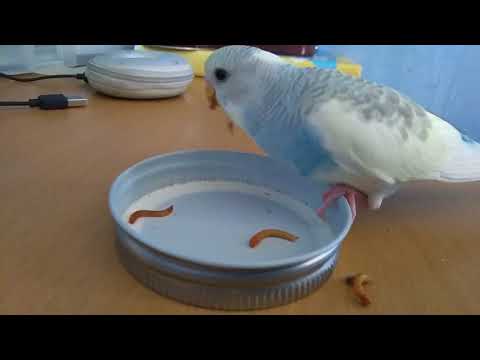Yes, budgies can eat mealworms; in fact, they can make a protein-rich supplement for the parakeets. It mightn’t be among their favorite meals, but it could still be a safe addition to their diet.
Can budgies eat mealworms, and are they nutritious? Regarding nutrition factors, mealworms are a good source of protein, fat, and amino acid. These nutrients can help their growth and keep them strong. But it’s not a complete food and must be offered moderately.
Regarding taste, the answer varies. Some owners say their budgies love mealworms, while others say they don’t. Will your budgie like it? And is it good for them? Some more details could help you find the answer.
Can You Feed Mealworms to Budgies
Mealworms are a good source of protein for budgies and are not harmful either. So while you can feed mealworms to budgies, the question is, should you?
Studies suggest birds like budgies, who mostly live on plant matter, should get insect protein occasionally. So mealworms fit in this category to make a good protein supplement for your budgies. They’re readily available in different feed stores, or you can breed them on your own.
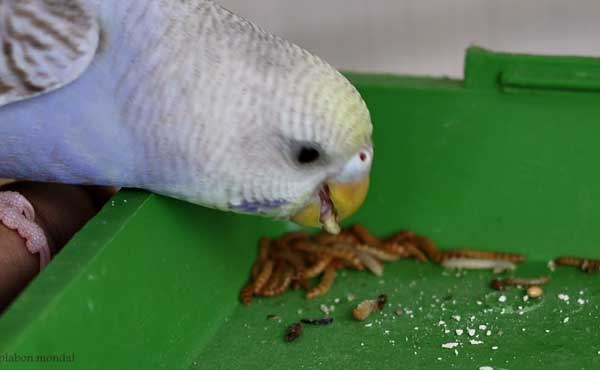
But you’ve to keep in mind a few things while feeding mealworms to your budgies-
- Your budgie doesn’t need a bunch of protein to stay healthy.
- It gets a decent amount of protein from pelleted bird seeds.
- Mealworms make only one source of protein out of many of them, like veggies, hard-boiled eggs, or fragmented meat.
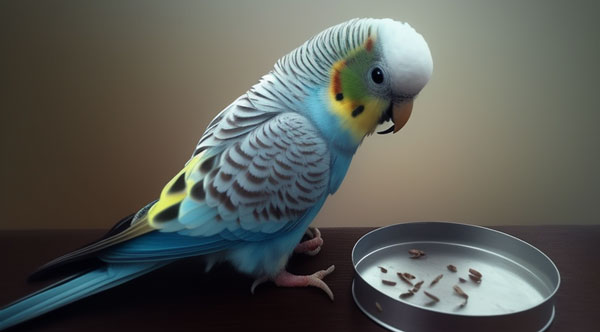
All these points mean you should feed budgies occasionally and in smaller quantities. Because it’s not something, your budgie can’t live without!
Do Budgies Like Mealworms?
The opinion varies. Some budgie owners say their budgies like mealworms, while others say they don’t. We’ve seen that the budgies on seeds mostly ignore eating mealworms initially. But once they get the taste, they generally start liking it, especially the live mealworms. Some even like the dried mealworms.
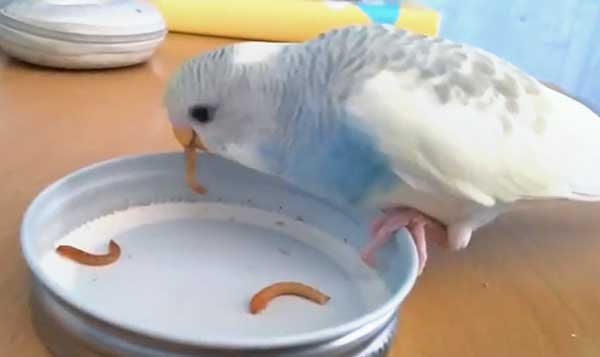
Health Benefits & Risks For Budgies Eating Mealworms
Let’s assess both the health benefits and risks of mealworms for budgies.
Health Benefits
Mealworms make an excellent source of animal proteins and amino acids for budgies. They need these nutrients to grow their feathers, bones, and muscles. Proteins also help the production of their hormones and enzymes.
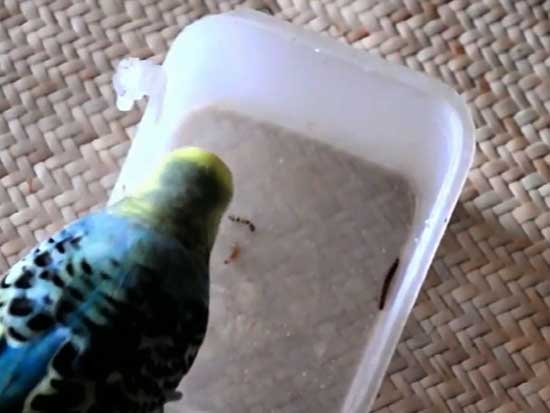
For that, they can’t rely on vegetables only and need to combine them with animal protein like mealworms. The health benefits of mealworms are similar to that of meat or fish. So eating mealworms occasionally in a lower quantity can ensure that your budgie stays strong and active.
Risks
Mealworms don’t have any terrible effect on budgies. But there could be side effects with excessive consumption, such as moisture imbalance that could result in diarrhea. Randomly taken mealworms such as the one taken from the garden could contain parasites or bacteria that can lead to severe illness.
How much Mealworms Should Budgies Eat?
Choosing the optimal amount of mealworms for your budgie could be tricky. Since your budgie mustn’t consume too much of them, the ideal portion size should be around 10% of its main diet. So you can offer 5 to 10 medium-size mealworms or 3 to 5 large mealworms once or twice weekly.
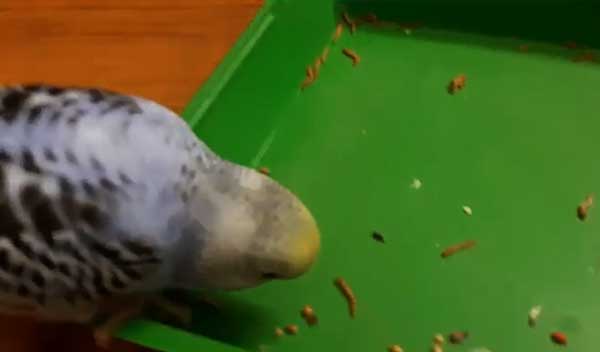
Why Shouldn’t You Feed Mealworms to Budgies?
Some budgie owners restrain themselves from feeding their budgies mealworms. They talk about a few reasons for doing so, which include:
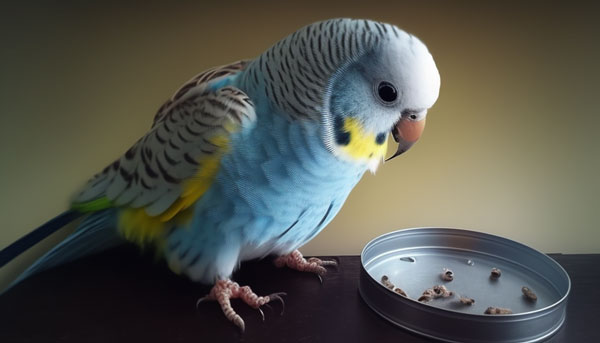
- The first reason is some owners think there are other safer protein sources than mealworms. And that could be a bit of shredded chicken or crushed hard-boiled egg.
- Many owners aren’t comfortable with mealworms and have entomophobia (the fear of insects). So they don’t want to breed or buy mealworms for their parakeets.
- Mealworms are high in protein and fat, so many think their budgie can gain unwanted fat by eating them, leading to different health issues.
- Finally, live mealworms can contain bacteria that can cause serious illness to the budgies.
Can you feed Mealworms to Baby Budgies? If so, how?
The experience says the baby budgies won’t eat mealworms and will nibble it if you offer them. They probably won’t eat because baby budgies need time to learn to eat themselves.
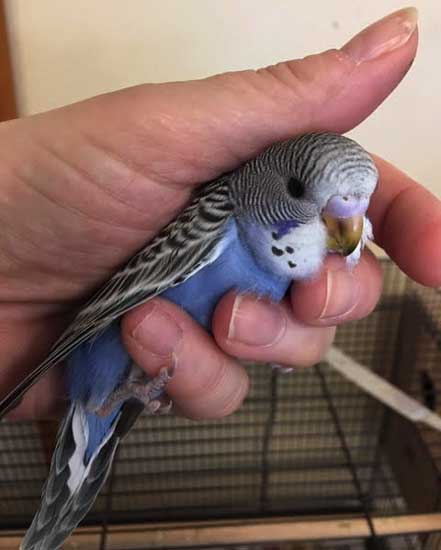
But there’s a way you can try to feed the mealworms to them. You have to crush the mealworms and then use a dropper to feed them to your nestling budgie. Once they get a bit older, try offering mini mealworms in a small portion. You might suddenly see them enjoying the food.
How do you prepare Mealworms for budgies?
Some budgie owners try different tricks while preparing mealworms for their budgies so that they like it more. You can prepare mealworm treats for your budgies in the following ways:
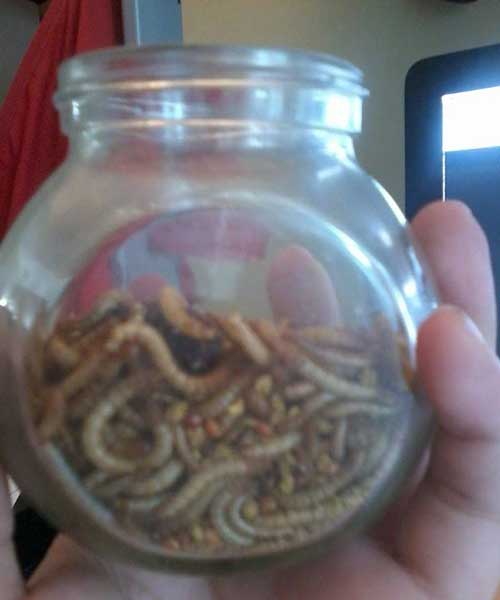
- If you’re planning to feed the live mealworm larvae, put them in a container and keep them in the refrigerator for 1 to 2 days. It’ll slow down their growth and keep them in the larval stage that your budgies should like the most. You can feed the larvae fresh vegetables like potatoes or carrots by that time, which will eventually be consumed by your budgie.
- For dried mealworms, place them in the feeder at your budgie’s feeding station. Soak them in water for at least 30 minutes before serving them to plump them and make them juicier and tastier. You can also mix them up with the budgie seeds or nuts if your budgies don’t like to eat them alone.
Video Of a Budgie Eating Mealworms
Check out the video below if you’re confused about whether budgies like mealworms or not; it’ll also give you an idea about breeding mealworms at home.
FAQs
Let’s get some FAQs answered below.
Since budgies are omnivores (check out parakeet facts), they can eat insects like caterpillars and digest them.
Yes, budgies can eat all parts of a boiled egg, including the yolk, albumen or the white part, and even the shell. The boiled egg is an excellent source of protein for budgies, and it’s also easy to feed them.
Don’t feed your budgie salty foods like chips or popcorn. Also, avoid feeding them beverages that contain caffeine or alcohol. Although it could be tempting to provide chocolate to your budgie, please don’t do that as it could harm their health.
Final Words
A seed-only diet lacks nutrition for your budgies. So you’ve to offer them a varied diet. According to a study, a live mealworm contains 13% fat, 20% protein, 2% fiber, and 62% moisture, while a dried mealworm contains 28% fat, 53% protein, 6% fiber, and 5% moisture.
So trying out live, enzyme-rich food like mealworms once or twice a week will add to your budgie’s nutrition value. But since it’s a rich source of protein and fat, you’ve to be careful about excessive consumption. So take a balanced approach by providing a small portion of mealworms to your budgie per week.
Do you know if your budgies can eat peppers or chicken? Read our articles about it to learn more.
